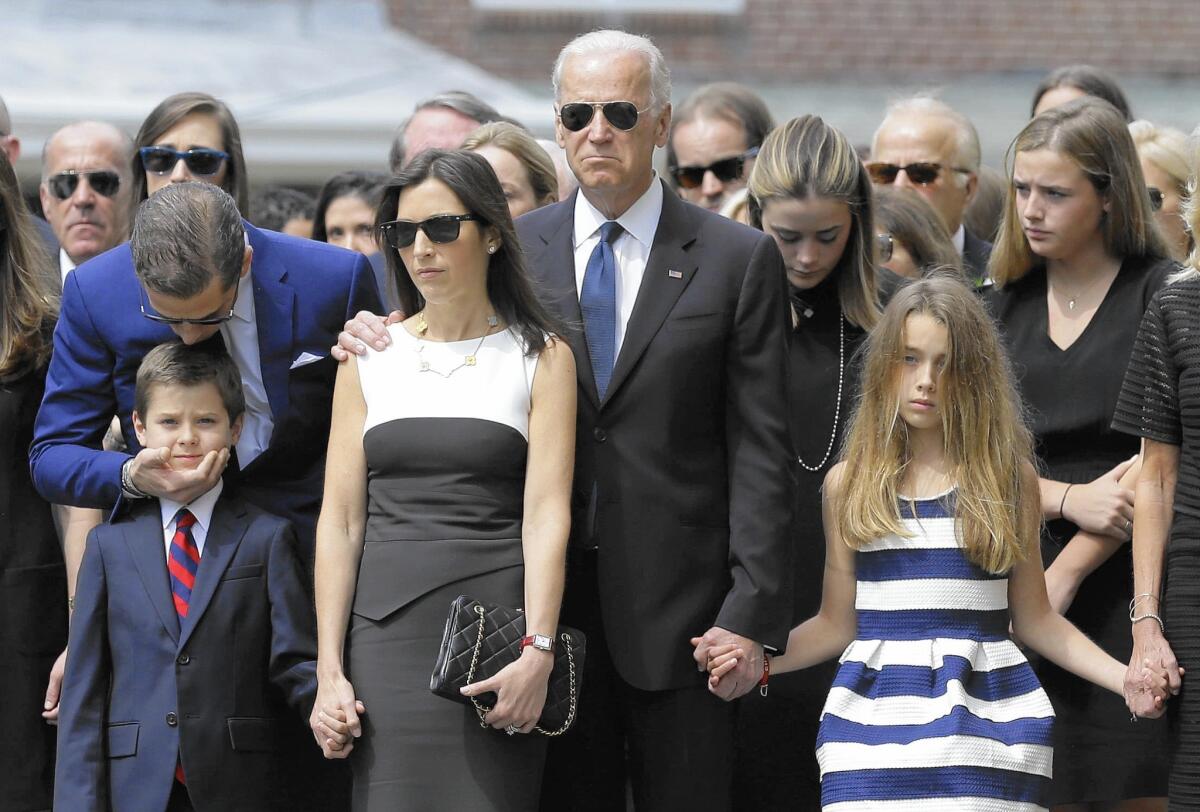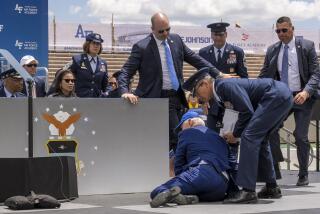Grief over son kept Joe Biden and family from committing to longtime aspiration to presidency

- Share via
WASHINGTON — Staring down the question of his political future late this summer, Vice President Joe Biden and his wife began meeting with a small circle of trusted advisors, who ticked off the decisions he needed to make were he to run for president. Core staff needed to be hired soon, a fundraising infrastructure built up quickly and a support network expanded in early states where deadlines loomed.
But each time, when asked to green-light key actions, the vice president would instead raise a yellow caution flag.
“We’re just not there yet,” he would say, according to a person familiar with the discussions. “My family and I are just not there yet.”
Though in public Biden would often seem ready to launch into his third campaign for the White House — with events that highlighted his strengths as a rampart for the middle class and veteran deal-maker — current and former aides and longtime friends suggested Wednesday that, in retrospect, the answer to the question hanging over the race for weeks was never in doubt.
Since the death of his son Beau in May, Biden wrestled with whether his family would be emotionally prepared to embark on the grueling undertaking that is a presidential campaign.
Ultimately, as Biden said Wednesday in announcing he wouldn’t run, the time frame to make a decision proved too short.
: :
Three years ago, after President Obama was reelected, Biden, still carrying his lifelong ambition to the presidency, began the groundwork for a potential campaign to succeed Obama. When Biden hosted a private swearing-in ceremony on inauguration day, the guest list was a who’s who of key party and early-state figures. “I see a number of superdelegates here,” longtime Democratic strategist Donna Brazile said that day as she surveyed the main floor of the vice president’s official home.
That summer, Biden was to be keynote speaker at an important fundraiser in the early-nominating state of Iowa, where he could signal the kind of campaign he might try to wage.
But weeks before the event, Beau, then attorney general of Delaware, was diagnosed with cancer. And though he was declared healthy after radiation and chemotherapy, Biden himself never entirely sensed the battle was over.
For two years, “he was doing anything he could to keep Beau alive,” one longtime family friend said.
This spring, Beau’s cancer returned, but an aggressive course of treatment proved insufficient.
In the final weeks of Beau’s life, politics was an occasional diversion only. Beau told his father he should run for president, but more than anything he said to him, “Promise me you’re going to be all right.” Some of Biden’s grandchildren had “WWBD” bracelets made up — “What would Beau do?” — to remind the family not to be consumed by grief.
Beau died May 30.
: :
It would be weeks before the vice president resumed his duties, and his son and family were clearly on his mind. In July, cheering the U.S. at the women’s World Cup final in Canada, Biden and Beau’s young son, Hunter, were nearly inseparable.
Slowly, as Biden ramped up his schedule, the question of whether he might take a new look at the race reappeared. Senior aides stepped up their scout work. Biden himself couldn’t ignore the question. It inevitably was a topic of conversation as he responded to the hundreds who’d reached out in sympathy in recent weeks. To think about a campaign so soon after Beau’s death, though, would be almost sacrilegious, Biden has said.
But in August, a New York Times column by Maureen Dowd described the scene of Beau imploring his father to run, putting a decidedly political twist on the message of the bracelets the vice president’s granddaughters had made.
“It sort of overwhelmed and enveloped the office,” according to one former aide, who like others interviewed would not be named in order to speak freely. “It felt like everything was through lens of, ‘Will he or won’t he? Is what we are doing in his best interests to possibly prepare for a run?’”
: :
Biden’s staff, deluged with interview requests since Beau’s death, decided to grant one to Stephen Colbert, the new host of CBS’ “Late Show,” to explain where the vice president was both as a grieving father and potential candidate. The outpouring that followed their emotional discussion enhanced Biden’s status, but he was still hesitant about whether to capitalize on it — and aware that the window might close before he knew for sure.
Indeed, as the weeks dragged on, the goodwill he had garnered appeared to wither, replaced with a sense in Washington and on the campaign trail that his ongoing and public deliberation was perhaps starting to undercut his standing as vice president.
A turning point came over Columbus Day weekend, according to people familiar with Biden’s deliberations. His son’s widow was among those who signaled their assent to a campaign. So Biden began a more intensive period of discussions with advisors and his network of former aides and political associates to determine whether a campaign would be viable — just as Democratic front-runner Hillary Rodham Clinton and her opponents faced off in a debate last week.
One of Clinton’s answers in that debate struck him: She listed Republicans as among her “enemies.” A key motivation for running would be Biden’s confidence that he could help mitigate some of the dysfunction in Washington. One call he made in his outreach was to Rep. Paul D. Ryan, his Republican opponent in the 2012 vice presidential debate, who was weighing a bid for speaker of the House. The two joked about their political uncertainties.
Biden’s distaste for Clinton’s comment spilled out in a way that fed speculation he would soon run. But in the final hours before he would put the guesswork about running to rest, he was given several reminders of the legacy he’d built over 43 years in public office and how he would risk it if he ran.
At an event Tuesday honoring a former vice president, Walter F. Mondale, Biden recalled his own election to the Senate in 1972 and the death of his first wife and infant daughter in a car crash weeks later. He spoke of how former Vice President Hubert Humphrey would visit to check up on him.
Later, at lunch, Biden and Obama reminisced about their first conversations about forming a political union in 2008 — and how Obama was surprised Biden simply wanted to be “not figuratively — literally — the last person in the room on every major decision.”
Finally, at a dinner featuring former President Carter, Biden complimented him for his grace.
When Biden returned to his official residence at the U.S. Naval Observatory in Washington, the decision he’d been grappling with for months became clear.
When he’d grieved over the death of his first wife and daughter at the start of his political career, he’d had nearly six years to decide whether to run another campaign. After Beau’s death, he faced a less forgiving timeline — and ultimately an insurmountable one.
“I know from previous experience that there is no timetable for this process,” Biden said in the White House Rose Garden on Wednesday, flanked by his wife, Jill, and Obama. “The process doesn’t respect or much care about things like filing deadlines or debates and primaries and caucuses.
“Unfortunately, I believe we’re out of time.”
He stepped away from the microphone, the Oval Office steps away, just outside his reach.
More to Read
Sign up for Essential California
The most important California stories and recommendations in your inbox every morning.
You may occasionally receive promotional content from the Los Angeles Times.














